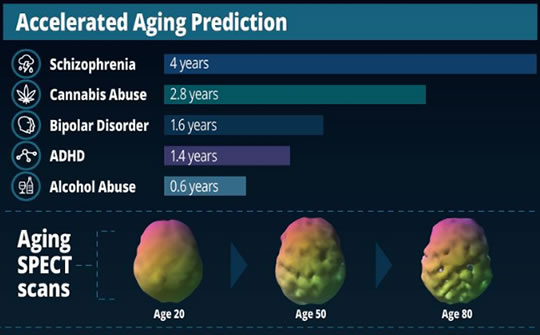A straightforward sign of brain health.
Keep reading with a Membership
• Read members-only articles
• Adverts removed
• Cancel at any time
• 14 day money-back guarantee for new members
A straightforward sign of brain health.
Your brain is cognitively 5 years younger at this time of year.
Largest ever study of its type reveals the disorders that accelerate brain aging.
Largest ever study of its type reveals the disorders that accelerate brain aging.
Schizophrenia, cannabis abuse and bipolar disorder accelerate brain aging the most, new research finds.
Schizophrenia ages the brain by an average of 4 years, cannabis abuse by 2.8 years and bipolar disorder by 1.6 years.
Fifth on the list, behind ADHD, was alcohol abuse, which ages the brain by an average of 1.4 years.
Depression and anxiety, however, were not linked to any premature brain aging.

Dr Daniel G. Amen, who led the study, said:
“Based on one of the largest brain imaging studies ever done, we can now track common disorders and behaviors that prematurely age the brain.
Better treatment of these disorders can slow or even halt the process of brain aging.
The cannabis abuse finding was especially important, as our culture is starting to see marijuana as an innocuous substance.
This study should give us pause about it.”
The conclusions come from the largest ever study of its type of 62,454 brain scans on over 30,000 people.
The SPECT (single photon emission computed tomography) brain scans measured the regional blood flow in the brain and how it is reduced in different disorders.
Dr George Perry, commenting on the study, said:
“This is one of the first population-based imaging studies, and these large studies are essential to answer how to maintain brain structure and function during aging.
The effect of modifiable and non-modifiable factors of brain aging will further guide advice to maintain cognitive function.”
Mr Sachit Egan, co-investigator from Google, said:
“This paper represents an important step forward in our understanding of how the brain operates throughout the lifespan.
The results indicate that we can predict an individual’s age based on patterns of cerebral blood flow.
Additionally, groundwork has been laid to further explore how common psychiatric disorders can influence healthy patterns of cerebral blood flow.”
The study was published in the Journal of Alzheimer’s Disease (Amen et al., 2018; image credit, Dr Daniel G. Amen).
Almost two-thirds of people in the US have this sign of an unhealthy brain.
Almost two-thirds of people in the US have this sign of an unhealthy brain.
Too much belly fat is a warning sign of an unhealthy brain, new research from over 5,000 people concludes.
The more belly fat people had, the worse their brain function was, as measured by tests of memory, language and their general mental faculties.
Belly fat is assessed by measuring the waist and the hips and then dividing one by the other to get a ratio.
Belly fat may be particularly bad for the brain due to increased secretion of inflammatory markers.
Inflammatory proteins — too many of which are bad for the body — frequently increase before people get dementia.
The study was carried out in Ireland where half the population over 50 is centrally obese.
Less than one-quarter of older people have a BMI (body mass index) in the normal range.
In the US, around 57% of people are centrally obese — having a waist larger than 40 inches.
Dr Conal Cunningham, who led the study, said:
“While we have known for some time that obesity is associated with negative health consequences our study adds to emerging evidence suggesting that obesity and where we deposit our excess weight could influence our brain health.
This has significant public health implications.”
The conclusions come from 5,186 people over 60 who were given tests of their cognitive function.
The research suggests that belly fat is a better index of cognitive health than BMI.
Although this study was carried out in older people, other research has suggested a link between obesity and cognitive decline.
The study’s authors write:
“In adults aged 19–65 years, cross-sectional studies suggest that the overweight perform worse on tests of semantic memory, visuospatial ability and executive function compared with normal-weight participants.
Prospective studies have observed lower cognitive scores and greater cognitive decline in obese v. normal-weight participants, with fastest decline in those with both obesity and metabolic abnormality.”
The study was published in the British Journal of Nutrition (Ntlholang et al., 2018).
Join the free PsyBlog mailing list. No spam, ever.